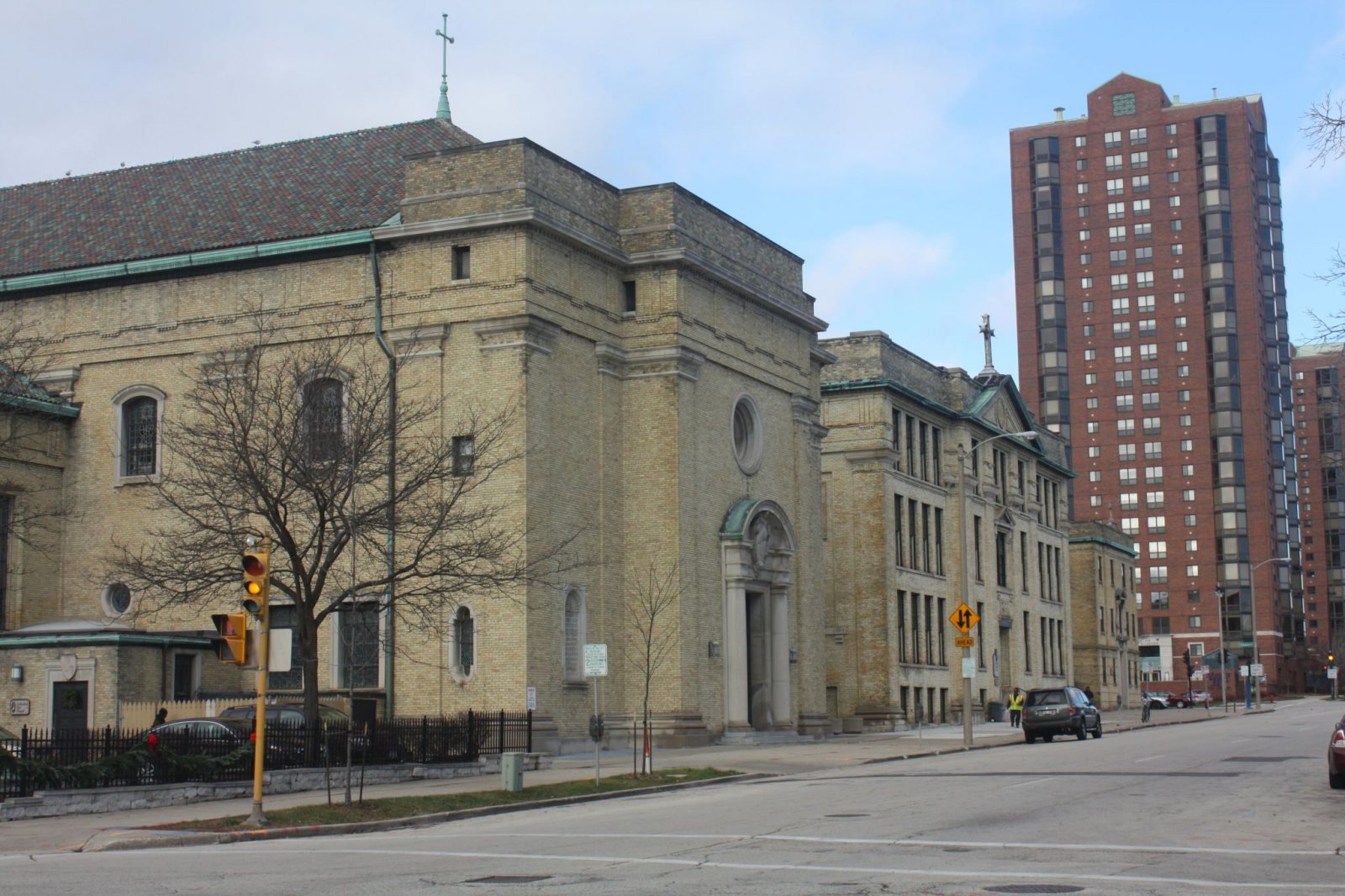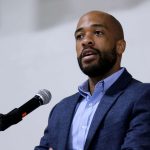The Legacy of Rembert Weakland
A once revered giant of the Catholic Church dies with a tarnished reputation.

The Archdiocese of Milwaukee in 2019 removed Weakland’s name from the pastoral center at the Cathedral of St. John the Evangelist in light of controversy surrounding his coverup of the clergy abuse scandal. Photo taken December 15th, 2015 by Carl Baehr.
More than a decade ago I ran into Archbishop Rembert Weakland at a Present Music concert. Weakland was an accomplished pianist and musical scholar who been a prominent supporter of Present Music and sometimes attended their concerts. I had done a feature story on Weakland for Milwaukee Magazine in the 1990s and interviewed him at length. He has also invited me and a few other members of the media to a soiree at his home, where we had dinner and he played a work for piano by Mozart. He was a master at charming the media.
Now the longtime Milwaukee archbishop was retired from that position and working on his memoir, he told me. “And I find that I’m very impressed with it,” he said.
On the other hand, the comment suggested how oblivious Weakland still was to the damage his reputation suffered after the mounting evidence of how he covered up — for decades — the clergy abuse scandal in Milwaukee. And even before that he had become infamous nationally as an archbishop accused of “date rape” with a younger man, who used $450,000 in archdiocesan funds to hush the accuser, and then faced a federal investigation of how the funds were used. Weakland would later call this a consenting affair between two adults, but the controversy forced him to step down from his job.
Now he was seeking to rescue his reputation with a memoir, A Pilgrim in a Pilgrim Church, that when it was published, generated more controversy. In the book he revealed that he was gay — possibly the first Catholic bishop to do this — and that while an archbishop he had relationships with several men because of “loneliness that became very strong.”
Yet, back in the early 1990s in a New Yorker feature story he had famously talked about the problems with celibacy, describing the desire he felt for some women. Was he really talking about his desire for other men?
Weakland used the memoir to argue that the Catholic teaching on homosexuality is wrong, and to explain how that caused great difficulties for someone like him. But he also wrote that as archbishop he understood that sex with minors was a sin, but not necessarily a crime. By the time the book was published there was mounting evidence through court documents that Archbishop Weakland had shredded reports about sexual abuse by priests and admitted allowing priests guilty of child sex abuse to continue as priests without warning parishioners or alerting the police. Rather than helping his reputation, Weakland’s book added more reason to question his handling of abusive priests.
The controversy affected even his attempt to retire somewhere else. In 2009, he had planned to move to St. Mary’s Abbey in Morristown, New Jersey, but backed down because of criticism of him living near a boys home. In 2014, he sought to move to the St. Vincent Archabbey in Latrobe, Pennsylvania, where he began his seminary studies as a boy in 1940 and later ran it as the archabbot, but the plan was opposed by the current archabbot, who feared this would cause negative publicity.
It was a stunning fall for someone who had risen so high so quickly. The son of a single mom whose family lived in poverty in the coal-mining town of Patton, PA, Weakland entered St. Vincent’s Archabbey at age 13 and remembered it as a “dream world,” a magnificent period building with a huge library, a collection of 17th century Bavarian art, and an enormous archive of musical scores, including first editions of Beethoven symphonies.
“I was used to being number one and I had to prove that over and over again,” Weakland told New Yorker writer Paul Wilkes. “The little boy from Patton, with the torn knickers, the little boy with the towering ego, had to show them — whoever ‘they’ were — that he was just as smart, just as quick.”
Weakland’s goal was to be a music teacher at St. Vincent’s, but fate had different plans for him. He rose quickly from head of the music department to archabbot of St. Vincent’s at age 36.
In that position, he attended meetings with fellow Benedictine leaders from around the world. “I was the go-between between the Americans and the Europeans because of my facility with languages,” Weakland recalled.
That talent led to his election in 1967 as Abbot Primate of the world-wide Benedictine Order at age 40, making him the first American and youngest person to ever hold that position. Weakland became an aggressive reformer who worked to modernize and transform the order, while establishing new communities in Korea, Japan, Thailand and India.
Paul’s decision to appoint Weakland as Milwaukee’s archbishop in 1977 raised questions at the time. Some believed he was being groomed as a future archbishop of Chicago or even the first American pontiff. After Paul’s successor John Paul I died, Weakland was mentioned in some newspapers as a remote possibility for pope.
But by then the liberal Weakland was out of step with a church whose top officials were conservative. And so Weakland the former Vatican insider became the rebel archbishop. He championed new roles for women and laity in the church; questioned its bans on abortion, birth control and divorce; and challenged the Vatican’s insistence on celibacy for an all-male priesthood. He helped found the Milwaukee AIDS Project. He led the 1986 drafting of the American bishops’ pastoral letter on the economy, which called for reordering the nation’s priorities to cut military spending and attack poverty and inequality.
By then many of the bishops critical of Rome looked at Weakland “as sort of a team captain,” claimed Michael Schwartz, director of the conservative Center for Social Policy.
Perhaps the most momentous of Weakland’s battles with Rome came in 1986, after Pope John Paul II stripped liberal Archbishop Raymond Hunthausen of his authority. American seminaries, universities and religious orders were also being probed by church authorities for evidence of disloyalty to the Vatican.
In the midst of this, and at a time when many conservatives predicted Weakland would be the next to go, he wrote two columns in the Catholic Herald and fired them off to the national media. Citing the historical excesses of the church and its “periodic witch hunts for heretics,” Weakland cautioned against the “fanaticism” that arises from “the desire to maintain the purity and the integrity of doctrine.”
Though Weakland was the titular head of the Wisconsin province, the Vatican overrode his choice (and the choice of Green Bay’s priests) for a bishop in 1990 and chose Robert Banks, a strong conservative. The media called it “a papal slap in the face” to Weakland. That same year, the Vatican refused permission to a Catholic university in Fribourg, Switzerland, to give an honorary degree to Weakland.
In short, this was a man with great courage on so many issues of the day, a towering figure in the church, but someone who never challenged an institution that was aiding and abetting clergy sex abuse. Quite the contrary, as noted in a statement by Peter Isely, a longtime leader of a Wisconsin-based anti-clergy abuse organization, now called Nate’s Mission, who called Weakland the “chief architect in the widespread and systematic abuse of children by clergy of the Archdiocese of Milwaukee. Thousands of children were harmed under his watch, and he bears the responsibility.”
“During his tenure as Archbishop of Milwaukee, Weakland transferred dozens of known sex offenders into new assignments where they were warmly welcomed by trusting Catholic families. These offenders then proceeded to abuse their children,” Isely charged.
In his book Weakland blamed psychologists who advised him that abusive priests could be treated and returned to work; he also blamed Vatican courts for taking years to remove abusers from the priesthood. But Isely noted that “Weakland coerced survivors into signing predatory settlement agreements and wielded the full force of the institutional Church including highly-paid corporate lawyers, complicit law enforcement officials, and the cultural prestige of the Church to prevent survivors from achieving justice.”
In the end Weakland was on this issue more the Vatican insider than the courageous rebel. His failure on clergy sex abuse was “a colossal tragedy,” as Isely put it, and ultimately a great tragedy for Weakland himself, one that, sadly, may overshadow all the good accomplished by him.
Murphy's Law
-
Top Health Care Exec Paid $25.7 Million
 Dec 16th, 2025 by Bruce Murphy
Dec 16th, 2025 by Bruce Murphy
-
Milwaukee Mayor’s Power in Decline?
 Dec 10th, 2025 by Bruce Murphy
Dec 10th, 2025 by Bruce Murphy
-
Total Cost of Foxconn Is Rising
 Dec 8th, 2025 by Bruce Murphy
Dec 8th, 2025 by Bruce Murphy




















He remains as an example of the Roman Catholic male leaderships horrific coverup of sexual abuse that was rampant among the clergy.
One only needs to look to the Irish church to see an example of what was happening all over the US.
His successor Dolan contributed to the horror by hiding $ and refusing to provide support for those who were harmed by the “true” church.
I am a RCR (roman catholic retired) and proud of it.
The current pope is trying to atone for so many offenses. He is a decent and holy man. He has done much good, but I fear when his time is done, reversion to the worst will prevail.
Even as I type I hear reports of how conservative the new priests are in this archdiocese and realize I will always be retired.
@kaygeeret – The Roman Catholic Church should eliminate the “vow of celibacy” for nuns and priests… A large number of people believe that Jesus and Mary Magdalene were more involved than what’s written in the Bible… Some people believe Jesus and Mary Magdalene were married and had children.
But the Catholic Church preaches that Jesus of Nazareth abstained from sex, so the clergy is required to do likewise…. They abstain from sex as though it was “unholy”… The pressure and stress from suppressing those thoughts, feelings, and biological needs leads them to do things they would never normally do.
There is nothing Biblical about celibate clergy. It was created by the Vatican in the 12th century and young boys have been suffering the consequences for 900 years.
A man with such vision and talent and ego and blind spots. Ugh. I hate the harm he collaborated in causing to children and families. Unless a great deal of healing goes on, abuse is passed on to future generations—one way or another.
I was a freshman at Thomas More High School when he became archbishop and I remember being proud to have an archbishop of such stature. Accomplished. Chaired the committee that wrote that great pastoral letter on the economy, And, I experienced cognitive dissonance hearing that he was helping to found the Milwaukee AIDS Project. What?? Such an awful time back then, and confusing for those of us who were still in the closet or in outright denial.
May he rest in peace.
Thank you Polaris.
I had many of the same feelings about him. He strengths were so profound to me.
I was disappointed when his affair was revealed but sympathized. I detested his coverup of the abuse of the young.
It seems to be a disease of any dictatorship. And make no mistake, most religions are dictatorships – follow me or be damned!
Abuse seems to come with power and veneration.
True study of some bible precepts with an emphasis on charity and giving might be in order. To be clear, the new testament only.
Or maybe we simply look at the complexities of modern life and turn our eyes to helping and supporting our fellow human beings regardless of random skin color or belief system.
Cults excepted.
Speaking of the Holy Bible, Catholicism, and the Holy Lands…
Joe Biden is currently flattening the Holy sites in Syria, where the Apostles preached, with another massive bombing campaign… Obama and Biden killed over 600,000 civilians in Syria 2008-2016…
During Biden’s recent trip to Israel, Israel’s Prime Minister called Joe Biden, “The Great Zionist”… Israel started a bombing campaign on the women and children of Palestine after Biden departed….
US President Biden hailed as ‘great Zionist’ by Israeli Prime Minister during Israel visit… https://www.youtube.com/results?search_query=joe+biden+zionist